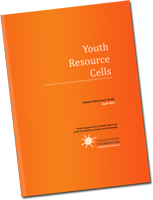Youth Resource Cells
YRCs are envisioned as hubs for community development - enabling young people to achieve their potential and bring about positive social change. The YRC Project sees young people as partners in the process of social change rather than beneficiaries. The process hopes to build ownership, responsibility and sustainability.
In this page:
The main components of the YRC Project:
Youth Fellowship | Residential Camps | Community Based Trainings | Action Projects and Youth Resources
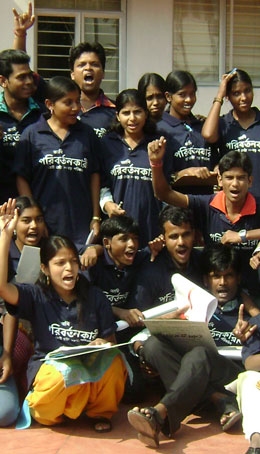
Project Partners
|
 |
 |
|
2008 - 2015 |
2014 - |
2014 - |
2007 - |
Download
YRC Impact Assessment Report 2011 (pdf 4 MB)
In this page:
The main components of the YRC Project:
Youth Fellowship | Residential Camps | Community Based Trainings | Action Projects and Youth Resources
YRC curriculum themes:
Self-to-Society | The Environment | Health | Human Rights
Meet the YRCs (2012-13)
YRC-2014 (4 MB) (2007-09): YRC Ujaan (1.5 MB) | YRC Manoranjan Ray Pally Sporting Club (1.3 MB) | YRC Gabberia Science Research Institute (1 MB) | YRC Yuva (980 KB)
Read the YRC Blog (2012 Ongoing): onlineyrc.blogspot.in
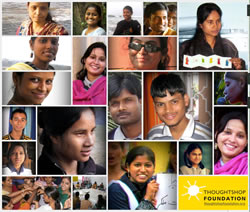
This is a year long programme to develop peer leaders, and forms the core of the YRC project. Urban and Rural young people in the age group of 16-25 years are eligible. Over the year, Fellows are helped to build or strengthen YRC groups in their respective neighbourhoods.
Fellows explore and connect with themselves and their neighbourhoods. They explore issues that include the environment, water sanitation hygiene, adolescent reproductive health (ARH), HIV/AIDS, human rights and gender.
They learn skills such as teamwork, facilitation, community survey techniques, peer counseling, public awareness and advocacy techniques, project planning and implementation.
All this happens over weekly day-long sessions at TF; through participatory workshops, research activities, film screenings and discussions.
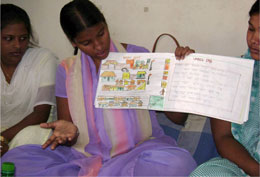
While most sessions are conducted by Youth Trainers, special workshops are also conducted by visiting faculty. Fellows also regularly share their learnings with their peer groups at the community. Interested Fellows can graduate to become Youth Trainers.
Download Fellowship process photo-documentation
YRC_FLS09.pdf (4.4 MB)
These are typically 3 to 4 day residential camps conducted by Youth Trainers or Fellows for other YRC group members. These camps are organised roughly once a quarter, and each one deals with one of the four main themes of the YRC curriculum.
This camp helps young people build self confidence, identify their strengths and the value of teamwork. It explores the need for change and helps young people understand the difference between a charity approach and a rights based approach to bringing about change in society. It introduces young people to facilitation skills, and planning for action projects.
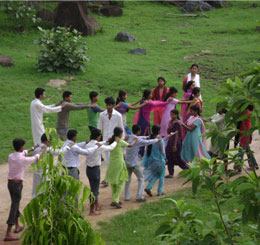
This camp deals with climate change, and water, sanitation & hygiene. Young people explore knowledge, attitudes, behaviours, and practices of their own, as well as those of the members in their community.
The Blue Planet Game, and the Watsan kit are used explore climate change and water-sanitation-hygiene issues respectively.
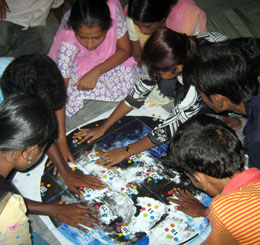
This camp focusses on ARH, and helps young people deal with their own physical and emotional changes. It is a platform to discuss taboo issues, and ways for young people to make informed choices in their own lives, as well as share correct information with their peers. These issues are discussed using the Champa, Shankar and IMLHIV kits.
The camp also helps young people get a first hand feel of community attitudes by helping them conduct and analyse a community survey. On the last day, young people plan and implement an action project on HIV/AIDS.
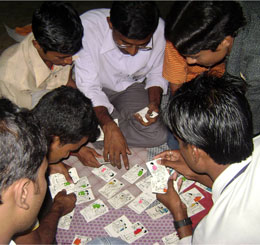
This camp begins by helping young people explore their multiple identities. It also helps young people understand how some of our attitudes are shaped through stereotypes. Concepts related to marginalisation and discrimination are discussed. Young people also explore human rights and learn to recognise violations. Some Human Rights and Gender issues are discussed using the Changemakers tools. So far, the ongoing We Can Campaign has been the action project for this theme.
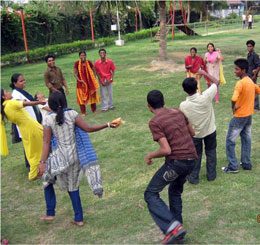
These are training sessions for YRC members who are unable to attend residential camps away from home. They are conducted by Fellows, with assistance from YRC members who have attended the relevant theme camps.
Community Based Trainings often take the form of participatory workshops or film screenings accompanied by discussions. These sessions are monitored by Youth Trainers.
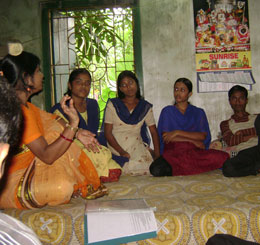
YRCs are assisted to plan and implement simple thematic action projects in their neighbourhood once every quarter.
Action Projects strengthen YRCs by helping members connect with the community, gain confidence, have fun “doing social stuff”, sharpen their understanding
of things learnt, innovate and test new patterns
of social engagement.
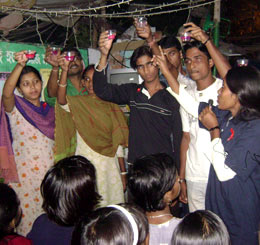
The YRC curriculum is encapsulated in a set of learning resources. Through the two year cycle, these resources are handed over to each of the YRCs for future use at the community. See Youth Resources list on the main page

